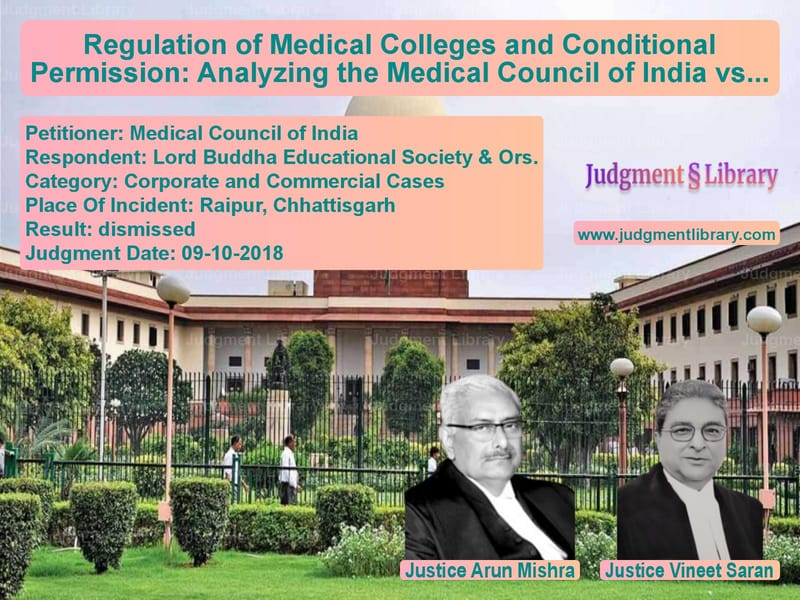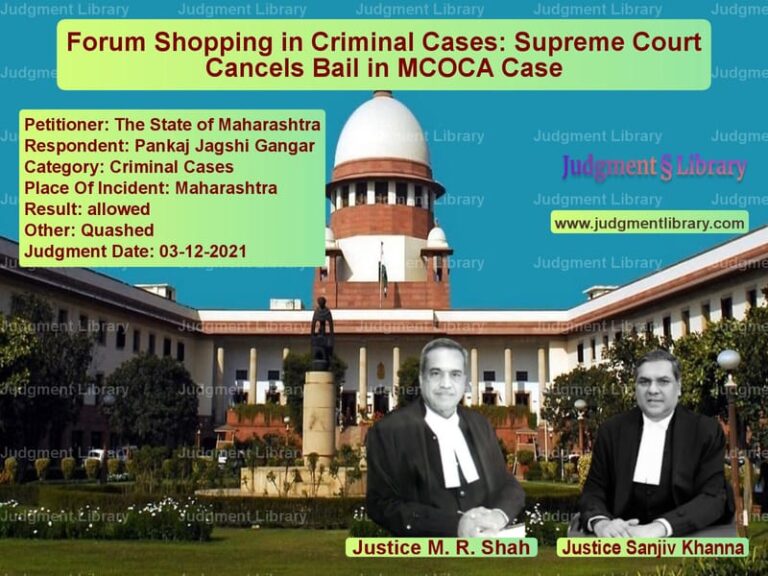Regulation of Medical Colleges and Conditional Permission: Analyzing the Medical Council of India vs. Lord Buddha Educational Society Case
The case of the Medical Council of India (MCI) vs. Lord Buddha Educational Society and Others focuses on the regulation of medical colleges and the process of granting conditional permission for medical colleges to operate and admit students. The appeal stems from a legal challenge by Lord Buddha Educational Society, which sought the renewal of its permission for admitting MBBS students for the academic years 2017-18 and 2018-19. The Medical Council of India had raised concerns over various deficiencies in the college’s infrastructure, faculty, and other required standards. Despite the conditional permission granted in 2016, the College failed to meet several prescribed conditions. The dispute ultimately reached the Supreme Court, which had to consider the application of regulatory provisions and whether the college should be allowed to admit students in the subsequent academic years.
Background of the Case
The college in question had been granted conditional permission by the Government of India to operate as a medical institution and admit MBBS students for the academic year 2016-17. The condition was that the college must fulfill certain requirements, particularly in the areas of infrastructure, clinical material, and teaching faculty. After inspection by the Medical Council of India (MCI) in 2016, it was found that the college had several deficiencies, including a shortage of faculty and inadequate infrastructure. The MCI recommended that the college be debarred from admitting students for the next two academic years, and it also directed that the bank guarantee of Rs. 2 crores provided by the institution be encashed.
The college challenged this recommendation by filing multiple writ petitions. In 2017, the High Court of Chhattisgarh directed the Government of India to reconsider the case and make a reasoned decision. Despite this, the college continued to face challenges regarding its compliance with the MCI regulations, leading to further rounds of inspections, legal petitions, and hearings in both the High Court and the Supreme Court.
Key Legal Issues
- Whether the Medical Council of India (MCI) had properly applied Regulation 8(3)(1)(a) of the Establishment of Medical College Regulations, 1999, in determining whether the college could be granted renewal for admitting students.
- Whether the deficiencies found in the college’s infrastructure and faculty were so severe that they justified the refusal of renewal of permission for the 2018-19 academic year.
- Whether the procedural and substantive violations by the college in addressing the deficiencies warranted legal action, including the encashment of the bank guarantee.
- Whether the High Court’s intervention in directing the reconsideration of the college’s application for renewal was justified, considering the statutory and regulatory framework.
Petitioner’s Arguments
The Medical Council of India, represented by its counsel, argued the following points in support of its position:
- The college had been granted conditional permission in 2016, but it failed to fulfill the prescribed conditions regarding faculty, infrastructure, and clinical material.
- The MCI’s inspections found serious deficiencies in the college, including a significant shortage of teaching faculty (21%) and residents (24.48%), as well as inadequate bed occupancy (33%).
- Despite being given an opportunity to rectify these deficiencies, the college had not complied, and therefore, it was justifiable to deny the renewal of permission for the 2018-19 academic year.
- The MCI had acted within its regulatory authority and had complied with the provisions set out in Regulation 8(3)(1)(a), which dictates that if the deficiencies exceed the prescribed thresholds, the college is not entitled to renewal.
- The Government of India had followed the proper process in considering the recommendations from the MCI and the Oversight Committee, and the decision to refuse renewal was a legitimate application of the law and regulations.
Respondent’s Arguments
Lord Buddha Educational Society, represented by its counsel, contended that:
- The deficiencies noted by the MCI were not of such a magnitude as to warrant the denial of renewal of permission.
- The MCI had improperly applied Regulation 8(3)(1)(a) of the Establishment of Medical College Regulations, 1999, which deals with the renewal of permission for colleges at the second renewal stage (i.e., after admitting the third batch of students). The college should have been given an opportunity to rectify the deficiencies.
- The deficiencies noted by the MCI were not of such a nature that they would prevent the college from offering quality education to students.
- The college had made efforts to comply with the regulations and had made representations to this effect, which were not given due consideration by the MCI or the Government of India.
- The encashment of the Rs. 2 crore bank guarantee was unjustified, as the deficiencies were not significant enough to warrant such drastic action.
The Court’s Judgment
The Supreme Court, after hearing both parties and reviewing the facts of the case, made the following key observations:
“The College was granted conditional permission by the Government of India in 2016, subject to the fulfillment of various conditions regarding infrastructure, faculty, and clinical material. The subsequent inspections revealed significant deficiencies in these areas, particularly the shortage of teaching faculty, residents, and low bed occupancy.”
The Court further noted:
“The deficiencies found were gross and could not be overlooked. The MCI and the Oversight Committee rightly invoked Regulation 8(3)(1)(a) to deny the renewal of permission for the academic year 2018-19. The provision clearly states that if the deficiencies exceed the prescribed thresholds, no opportunity for rectification should be given in the same academic year.”
Additionally, the Court stated:
“It is clear from the evidence presented that the deficiencies in faculty and infrastructure were not minor. The college had failed to comply with the conditions set out by the Oversight Committee and the Government of India. The denial of renewal for the academic year 2018-19 was therefore justified.”
The Court also addressed the issue of the bank guarantee and the procedural fairness of the MCI and Government’s actions:
“The encashment of the bank guarantee was a necessary step to ensure that the college complied with the conditions set forth. The decision to encash the guarantee was not made arbitrarily but in response to the college’s failure to meet the prescribed standards.”
Conclusion
The Supreme Court upheld the decisions made by the MCI and the Government of India to deny the renewal of permission for the college to admit students for the academic year 2018-19. The Court found that the deficiencies in faculty, residents, and infrastructure were gross and could not be remedied within the same academic year. The Court also upheld the encashment of the bank guarantee, concluding that the college’s failure to comply with the necessary regulations warranted such action.
Key Points from the Judgment:
- The college had been granted conditional permission in 2016 but failed to fulfill the prescribed conditions regarding faculty, infrastructure, and clinical material.
- The deficiencies found by the MCI were gross, with a 21% shortage in faculty, a 24.48% shortage in residents, and a 33% bed occupancy rate, which were well below the prescribed standards.
- The Court upheld the denial of renewal of permission for the 2018-19 academic year, citing Regulation 8(3)(1)(a) of the Establishment of Medical College Regulations, which mandates that no compliance opportunity should be given if deficiencies exceed certain thresholds.
- The encashment of the bank guarantee was upheld as a necessary action to ensure the college’s compliance with regulations.
Petitioner Name: Medical Council of India.Respondent Name: Lord Buddha Educational Society & Ors..Judgment By: Justice Arun Mishra, Justice Vineet Saran.Place Of Incident: Raipur, Chhattisgarh.Judgment Date: 09-10-2018.
Don’t miss out on the full details! Download the complete judgment in PDF format below and gain valuable insights instantly!
Download Judgment: Medical Council of I vs Lord Buddha Educatio Supreme Court of India Judgment Dated 09-10-2018.pdf
Direct Downlaod Judgment: Direct downlaod this Judgment
See all petitions in Education Related Cases
See all petitions in Promotion Cases
See all petitions in Public Sector Employees
See all petitions in Recruitment Policies
See all petitions in Judgment by Arun Mishra
See all petitions in Judgment by Vineet Saran
See all petitions in dismissed
See all petitions in supreme court of India judgments October 2018
See all petitions in 2018 judgments
See all posts in Corporate and Commercial Cases Category
See all allowed petitions in Corporate and Commercial Cases Category
See all Dismissed petitions in Corporate and Commercial Cases Category
See all partially allowed petitions in Corporate and Commercial Cases Category







